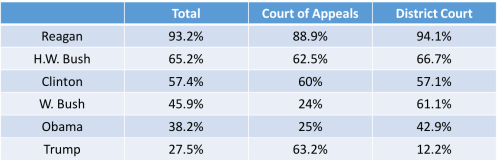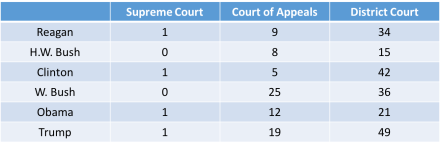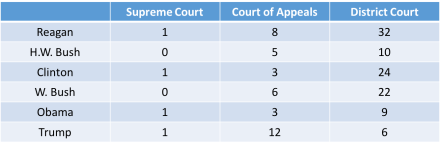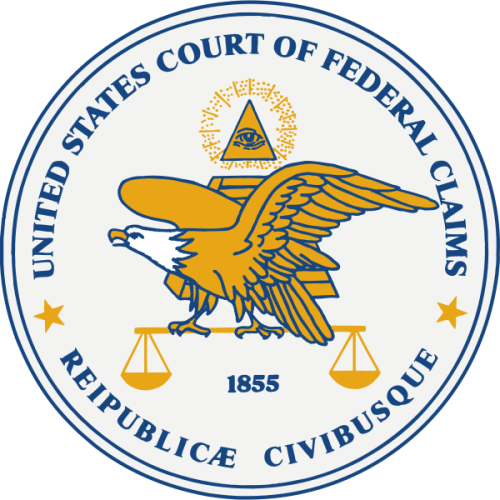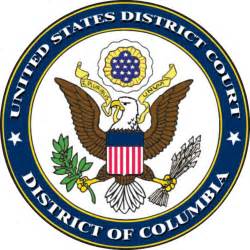
The Federal Courthouse in Lawton, Oklahoma
Judge Charles Goodwin was the first Trump nominee to receive a rating of unqualified from the American Bar Association. Goodwin’s rating is particularly unusual, because, unlike the other two district court nominees who received the rating, Goodwin has been in practice for twenty years, and has served as a federal magistrate judge for the last four years.
Background
Goodwin has deep Oklahoma ties. Charles Barnes Goodwin was born in Clinton, OK in 1970 to Charles L. and Nancy Goodwin. His father, Charles L. “Buzz” Goodwin had served as a city councilman, city attorney, and mayor of Clinton before becoming elected as a state judge.[1] Goodwin attended the University of Oklahoma, graduating with a B.A. in Letters and Economics in 1994. He then attended the University of Oklahoma Law School, graduating in 1997.
After graduating, Goodwin served as a law clerk to then U.S. Magistrate Judge Claire Egan on the U.S. District Court for the Northern District of Oklahoma.[2] He then served as a law clerk to Judge Lee West on the U.S. District Court for the Western District of Oklahoma. In 2000, Goodwin joined the Oklahoma City office of Crowe & Dunleavy as an Associate. In 2006, he became a Shareholder-Director.
In 2013, Goodwin became a federal magistrate judge on the U.S. District Court for the Western District of Oklahoma. He currently serves in that capacity.
History of the Seat
The seat Goodwin has been nominated for opened on July 14, 2015, with Judge Robin Cauthron’s move to senior status. While Cauthron moved to senior status with a year and a half left in the Obama Administration, no nominee was ever submitted for the vacancy.
Goodwin applied to fill the vacancy on November 30, 2016, shortly after the election of Donald Trump.[3] After interviews with Oklahoma Senators James Inhofe and James Lankford, as well as with the White House and the Department of Justice, Goodwin was selected as a nominee in April 2017. Goodwin was officially nominated on July 13, 2017, almost exactly two years to the day the vacancy opened.
Political Activity
Goodwin has a relatively short record of political activity. He donated $500 to John McCain’s presidential campaign in 2008 and $1500 to Mitt Romney’s campaign in 2012.[4] Additionally, he provided informal legal advice to the campaign of Ryan Leonard, a Republican running unsuccessfully for Oklahoma Attorney General in 2010.
In 2010, Goodwin applied to Democratic Governor Brad Henry for an appointment to the Oklahoma Supreme Court.[5] However, Goodwin was not selected as one of the finalists for the seat and Henry appointed Oklahoma County District Judge Noma Gurich instead.[6]
Legal Experience
After stints as a law clerk for Judges Eagan and West, Goodwin joined Crowe & Dunleavy to work in commercial litigation. In this capacity, Goodwin appeared in both state and federal court in securities, antitrust, fraud, contract, and class action cases. Among the more significant matters he handled, Goodwin represented Duoyuan Global Water, Inc. in defending against a securities class action.[7]
In another matter, Goodwin represented 400 Oklahoma poultry farmers in a class action alleging violations of the Packers and Stockyards Act.[8] After the district court granted summary judgment against Goodwin’s clients, he successfully argued for the ruling’s reversal from the Tenth Circuit.[9] Goodwin then successfully defended the jury verdict for his clients before the Tenth Circuit,[10] and the Supreme Court.[11]
Jurisprudence
Goodwin has served as a U.S. Magistrate Judge on the U.S. District Court for the Western District of Oklahoma since 2013. In this role, Goodwin presides over pretrial, trial, grand jury and discovery matters.
Benefits Cases
Goodwin has frequently heard appeals from denials of social security benefits by administrative law judges (ALJ). In many of these cases, Goodwin has affirmed the denial of benefits.[12] However, Goodwin has just as frequently reversed in favor of claimants.[13] In one notable case, Goodwin found that the ALJ failed to consider the role of the plaintiff’s mental health defects on his disability.[14] In another case, Goodwin found that the ALJ had failed to consider the role of the plaintiff’s obesity on his disability.[15] However, the district court declined to follow Goodwin’s recommendation, finding that the ALJ had correctly decided the case.[16]
Civil Rights Suits
As a U.S. Magistrate Judge, Goodwin frequently offers the preliminary recommendations on civil rights suits filed by prisoners and others under §1983. In almost every single suit he has reviewed, Goodwin has recommended rejection of the plaintiff’s claims.[17] While Goodwin’s recommendations have generally been accepted by the district courts, they have been rejected in some cases.[18] In one case, Goodwin recommended the dismissal of a civil rights claim based on denial of medical care to an inmate.[19] Specifically, he ruled that there was no allegation of knowledge by the defendant medical administrator of the lack of care.[20] In rejecting the recommendation, the district judge found that the administrator’s knowledge could be assumed.[21] In another case, the district judge declined to adopt Goodwin’s conclusion that the plaintiff had failed to properly exhaust administrative remedies prior to filing the suit.[22]
Overall Assessment
On paper, Charles Goodwin is a well-qualified candidate for the federal bench. However, it’s impossible to discuss Goodwin’s qualifications without addressing the elephant in the room: his Unqualified rating from the ABA.
Generally, the ABA identifies three criteria that are key in its evaluation: integrity, professional competence and judicial temperament.[23] While the ABA has been criticized for using an additional ideological test to downgrade conservative candidates, there are plenty of examples of the ABA highly rating conservative candidates, including the highest Well Qualified ratings for Fifth Circuit nominees Don Willett, James Ho, and Kyle Duncan. At any rate, while Goodwin’s judicial record is conservative, it is not unusually so.
Instead, the ABA, in a Dec. 12th letter, explained that its criteria was Goodwin’s “work ethic.” Specifically, ABA Standing Committee past Chair Nancy Deegan noted that “Magistrate Judge Goodwin’s work habits, including his frequent absence from the courthouse until mid-afternoon” raised concerns. Deegan went on to note that “no issues were noted regarding Magistrate Judge Goodwin’s judicial temperament, intellectual capacity, writing and analytical abilities, knowledge of the law, or breadth of professional experience.”
Setting aside the ABA rating, there is little in Goodwin’s record that would disqualify him from the federal bench. As such, Goodwin’s confirmation turns on how concerning senators find his work ethic.
[2] Eagan was nominated to a lifetime appointment by President George W. Bush and confirmed in 2001.
[5] See Michael McNutt, Askins Seeks Seat on State’s High Court, The Oklahoman, Nov. 23, 2010.
[7] See Ho v. Duoyuan Global Water, Inc., 887 F. Supp. 2d 547 (S.D.N.Y. 2012).
[8] See Jim Stafford, Appeals Court Reinstates Farmers’ Lawsuit, The Oklahoman, Aug. 1, 2007.
[9] See Been et al. v. OK Indus., Inc., 495 F.3d 1217 (10th Cir. 2007).
[10] Been v. OK Indus., Inc., 398 F. App’x 382 (10th Cir. 2010).
[11] OK Indus., Inc. v. Been, 563 U.S. 975 (2011) (denying certiorari).
[12] See, e.g., Packer v. Colvin, No. CIV-15-655-CG, 2016 WL 6770271 (W.D. Okla. Nov. 15, 2016); Hall v. Colvin, No. CIV-15-105-CG, 2016 WL 5239832 (W.D. Okla. Sep. 22, 2016). See also Austin v. Colvin, No. CIV-13-1089-L, 2015 WL 631065 (W.D. Okla. Feb. 12, 2015); Stringer v. Colvin, No. CIV-13-1053-HE, 2014 WL 6879083 (W.D. Okla. Dec. 4, 2014); Payne v. Colvin, No. CIV-13-650-R, 2014 WL 4929434 (W.D. Okla. Sept. 29, 2014); Salazar v. Colvin, No. CIV-13-878-F, 2014 WL 4668794 (W.D. Okla. Sept. 18, 2014); Thompson v. Colvin, No. CIV-13-744-R, 2014 WL 4660805 (W.D. Okla. Sept. 17, 2014); Keeling v. Colvin, No. CIV-13-498-M, 2014 WL 4388411 (W.D. Okla. Sept. 5, 2014); Devers v. Colvin, No. CIV-12-1285-D, 2014 WL 1272108 (W.D. Okla. Mar. 27, 2014); Humphreys v. Colvin, No. CIV-13-0098-HE, 2014 WL 1270748 (W.D. Okla. Mar. 25, 2014).
[13] See, e.g., Thompson v. Colvin, No. CIV-13-922-F, 2015 WL 586298 (W.D. Okla. Feb. 11, 2015); Johnson v. Colvin, No. CIV-13-871-R, 2014 WL 7187050 (W.D. Okla. Dec. 16, 2014); Hendrix v. Colvin, No. CIV-13-522-M, 2014 WL 4929427 (W.D. Okla. Sept. 30, 2014); Omes v. Colvin, No. CIV-13-375-HE, 2014 WL 4674364 (W.D. Okla. Aug. 29, 2014), report and recommendation adopted, No. CIV-13-0375-HE, 2014 WL 4674342 (W.D. Okla. Sept. 17, 2014); Shortnacy v. Colvin, No. CIV-13-297-HE, 2014 WL 4716075 (W.D. Okla. Aug. 26, 2014), report and recommendation adopted, No. CIV-13-0297-HE, 2014 WL 4716055 (W.D. Okla. Sept. 22, 2014); Cook v. Colvin, No. CIV-13-211-HE, 2014 WL 4209574 (W.D. Okla. July 30, 2014), report and recommendation adopted, No. CIV-13-0211-HE, 2014 WL 4209576 (W.D. Okla. Aug. 25, 2014); Williams v. Colvin, No. CIV-13-448-R, 2014 WL 2949470 (W.D. Okla. June 27, 2014); Robles v. Colvin, No. CIV-13-378-CG, 2014 WL 2219230 (W.D. Okla. May 29, 2014); Iles v. Colvin, No. CIV-13-0221-F, 2014 WL 1330010 (W.D. Okla. Mar. 31, 2014); Moore v. Colvin, No. CIV-13-60-M, 2014 WL 1344582 (W.D. Okla. Mar. 31, 2014); Hull v. Colvin, No. CIV-13-67-D, 2014 WL 1343502 (W.D. Okla. Mar. 31, 2014); Henderson v. Colvin, No. CIV-13-168-M, 2014 WL 1270978 (W.D. Okla. Mar. 26, 2014); Elix ex rel. JE v. Colvin, No. CIV-13-0139-HE, 2014 WL 903176 (W.D. Okla. Mar. 7, 2014); Pennington v. Colvin, No. CIV-12-1026-F, 2014 WL 869292 (W.D. Okla. Mar. 5, 2014); Redman v. Colvin, No. CIV-12-1039-R, 2014 WL 652314 (W.D. Okla. Feb. 19, 2014); Crowell v. Colvin, No. CIV-12-1126-L, 2013 WL 6800821 (W.D. Okla. Dec. 20, 2013).
[14] McClaflin v. Colvin, No. CIV-14-1128-CG, 2016 WL 5390908 (W.D. Okla. Sep. 27, 2016).
[15] Sanders v. Colvin, No. CIV-14-799-R, 2015 WL 5559868 (W.D. Okla. Aug. 18, 2015), report and recommendation rejected, No. CIV-14-799-R, 2015 WL 5559872 (W.D. Okla. Sept. 21, 2015).
[16] Sanders v. Colvin, No. CIV-14-799-R, 2015 WL 5559872 (W.D. Okla. Sept. 21, 2015).
[17] See, e.g., Alfred v. Alfred, No. CIV-17-273-C, 2017 WL 4563889, at *1 (W.D. Okla. Sept. 5, 2017), report and recommendation adopted, No. CIV-17-273-C, 2017 WL 4563062 (W.D. Okla. Oct. 12, 2017); Daly v. Gossen, No. CIV-15-13-C, 2017 WL 1051176, at *9 (W.D. Okla. Feb. 16, 2017), report and recommendation adopted, No. CIV-15-13-C, 2017 WL 1051140 (W.D. Okla. Mar. 20, 2017); Collins v. Payne Cty., No. CIV-15-1294-R, 2016 WL 7634475, at *1 (W.D. Okla. Nov. 30, 2016), report and recommendation adopted, No. CIV-15-1294-R, 2017 WL 31427 (W.D. Okla. Jan. 3, 2017); Tuell v. Kingfisher Cty., No. CIV-16-86-D, 2016 WL 7414597, at *1 (W.D. Okla. Nov. 30, 2016), report and recommendation adopted, No. CIV-16-86-D, 2016 WL 7410738 (W.D. Okla. Dec. 22, 2016); Blackburn v. Reeve, No. CIV-15-359-F, 2016 WL 3944940, at *1 (W.D. Okla. June 23, 2016), report and recommendation adopted, No. CIV-15-0359-F, 2016 WL 3945831 (W.D. Okla. July 19, 2016); Beals v. Elk City Police Dep’t, No. CIV-15-195-C, 2016 WL 3573241, at *1 (W.D. Okla. May 31, 2016), report and recommendation adopted, No. CIV-15-195-C, 2016 WL 3582152 (W.D. Okla. June 28, 2016); Barnett v. Sielert, No. CIV-14-1284-HE, 2016 WL 3802678, at *6 (W.D. Okla. May 31, 2016), report and recommendation adopted, No. CIV-14-1284-HE, 2016 WL 3829027 (W.D. Okla. July 12, 2016); Wilson v. Henry, No. CIV-15-1026-R, 2016 WL 3512035, at *4 (W.D. Okla. May 26, 2016), report and recommendation adopted, No. CIV-15-1026-R, 2016 WL 3523756 (W.D. Okla. June 22, 2016); Jordanoff v. Red Rock Adult Behavioral Health Ctr., No. CIV-15-846-R, 2016 WL 3561807, at *1 (W.D. Okla. May 11, 2016), report and recommendation adopted, No. CIV-15-846-R, 2016 WL 3566264 (W.D. Okla. June 27, 2016); Bishop v. Jester, No. CIV-14-678-C, 2016 WL 3526206, at *1 (W.D. Okla. May 11, 2016), report and recommendation adopted, No. CIV-14-678-C, 2016 WL 3546419 (W.D. Okla. June 23, 2016); Ray v. Dep’t of Corr., No. CIV-14-735-C, 2016 WL 1212773, at *6 (W.D. Okla. Mar. 2, 2016), report and recommendation adopted sub nom. JAMES PRESTON RAY, Plaintiff, vs. DEPARTMENT OF CORRECTIONS, et al., Defendants., No. CIV-14-735-C, 2016 WL 1228664 (W.D. Okla. Mar. 28, 2016); Coughlin v. Bear, No. CIV-15-536-R, 2016 WL 447345, at *6 (W.D. Okla. 2016), report and recommendation adopted, No. CIV-15-536-R, 2016 WL 447744 (W.D. Okla. Feb. 4, 2016); Beals v. Webb, No. CV 15-194-C, 2015 WL 8654450, at *1 (W.D. Okla. Nov. 24, 2015), report and recommendation adopted, No. CIV-15-194-C, 2015 WL 8678409 (W.D. Okla. Dec. 11, 2015); Burghart v. O’Keefe, No. CIV-15-445-C, 2015 WL 9208842, at *4 (W.D. Okla. Oct. 30, 2015), report and recommendation adopted, No. CIV-15-445-C, 2015 WL 9095029 (W.D. Okla. Dec. 16, 2015); Kirbo v. Patton, No. CIV-15-583-W, 2015 WL 7294389, at *1 (W.D. Okla. Oct. 28, 2015), report and recommendation adopted, No. CIV-15-583-W, 2015 WL 7303553 (W.D. Okla. Nov. 18, 2015); Bishop v. Stewart, No. CIV-14-775-C, 2015 WL 7767264, at *3 (W.D. Okla. Oct. 16, 2015), report and recommendation adopted, No. CIV-14-775-C, 2015 WL 7779696 (W.D. Okla. Dec. 2, 2015); Barber v. Sutmiller, No. CIV-15-78-C, 2015 WL 5472508, at *3 (W.D. Okla. July 31, 2015), report and recommendation adopted, No. CIV-15-78-C, 2015 WL 5472940 (W.D. Okla. Sept. 17, 2015); Williams v. Cox, No. CIV-13-0971-F, 2015 WL 159053, at *1 (W.D. Okla. Jan. 8, 2015); Smith v. Jones, No. CIV-12-1365-HE, 2014 WL 5448890, at *3 (W.D. Okla. Oct. 23, 2014), aff’d, 606 F. App’x 899 (10th Cir. 2015); Darnell v. Jones, No. CIV-12-1065-M, 2014 WL 4792144, at *2 (W.D. Okla. Sept. 24, 2014), aff’d, 610 F. App’x 720 (10th Cir. 2015); Craft v. Glob. Expertise in Outsourcing, No. CIV-12-1133-R, 2014 WL 4699614, at *4 (W.D. Okla. Sept. 19, 2014), aff’d sub nom. Craft, Jr. v. Glob. Expertise in Outsourcing, 601 F. App’x 748 (10th Cir. 2015); Davis v. Corr. Corp. of Am., No. CIV-13-1174-HE, 2014 WL 4716332, at *1 (W.D. Okla. July 30, 2014), report and recommendation adopted, No. CIV-13-1174-HE, 2014 WL 4716209 (W.D. Okla. Sept. 22, 2014); Farris v. Frazier, No. CIV-12-1099-W, 2014 WL 3749142, at *2 (W.D. Okla. July 29, 2014), aff’d, 599 F. App’x 851 (10th Cir. 2015); Hill v. Cates, No. CIV-13-1126-D, 2014 WL 2865920, at *1 (W.D. Okla. June 24, 2014); Failes v. Garfield Cty. Bd. of Cty. Comm’rs, No. CIV-13-0638-HE, 2014 WL 2712276, at *1 (W.D. Okla. June 16, 2014); Parkins v. Logan Cty., No. CIV-14-72-M, 2014 WL 2504517, at *1 (W.D. Okla. June 3, 2014); Free v. Stebens, No. CIV-13-14-F, 2014 WL 800915, at *6 (W.D. Okla. Feb. 28, 2014); Adams v. Sutmiller, No. CIV-10-920-F, 2014 WL 584749, at *2 (W.D. Okla. Feb. 12, 2014), aff’d sub nom. Adams v. Jones, 577 F. App’x 778 (10th Cir. 2014); Large v. Beckham Cty. Dist. Court, No. CIV-13-1276-F, 2014 WL 235477, at *1 (W.D. Okla. Jan. 22, 2014); Gray v. Ritter, No. CIV-11-1446-F, 2014 WL 37745, at *4 (W.D. Okla. Jan. 6, 2014); Gist v. Anderson, No. CIV-12-1208-HE, 2013 WL 6909470, at *2 (W.D. Okla. Dec. 30, 2013); Klein v. Gwinn, No. CIV-13-1207-HE, 2013 WL 6844276, at *2 (W.D. Okla. Dec. 27, 2013). But see Savage v. Troutt, No. CIV-15-670-HE, 2016 WL 8711398, at *1 (W.D. Okla. Aug. 12, 2016), report and recommendation adopted as modified, No. CIV-15-0670-HE, 2016 WL 5107068 (W.D. Okla. Sept. 20, 2016) (recommending partial denial of defendant’s motion for summary judgment); Moore v. Pantoja, No. CIV-15-688-HE, 2016 WL 4493849, at *1 (W.D. Okla. July 26, 2016) (recommending denial of defendant’s motion for summary judgment); Young v. Rios, No. CIV-15-641-R, 2016 WL 1626609, at *5 (W.D. Okla. Mar. 10, 2016), report and recommendation adopted, No. CIV-15-641-R, 2016 WL 1611496 (W.D. Okla. Apr. 21, 2016).
[18] See, e.g., Williams v. Ormand, No. CIV-15-1288-HE, 2016 WL 6157651, at *1 (W.D. Okla. July 8, 2016), report and recommendation rejected, No. CIV-15-1288-HE, 2016 WL 6157429 (W.D. Okla. Oct. 21, 2016); Campbell v. Jones, No. CIV-13-926-R, 2015 WL 3971674, at *15 (W.D. Okla. Mar. 31, 2015), report and recommendation adopted in part, rejected in part, No. CIV-13-926-R, 2015 WL 3989137 (W.D. Okla. June 30, 2015); Jennings v. Dowling, No. CIV-14-335-C, 2015 WL 12915602, at *1 (W.D. Okla. Mar. 3, 2015), report and recommendation rejected, No. CIV-14-335-C, 2015 WL 12915603 (W.D. Okla. Mar. 31, 2015); Ford v. GEO Grp. Inc., No. CIV-13-1013-R, 2014 WL 4929443, at *1 (W.D. Okla. Aug. 8, 2014), report and recommendation rejected, No. CIV-13-1013-R, 2014 WL 4929334 (W.D. Okla. Sept. 30, 2014).
[19] Campbell v. Jones, No. CIV-13-926-R, 2015 WL 3971674 (W.D. Okla. Mar. 31, 2015).
[21] Campbell v. Jones, No. CIV-13-926-R, 2015 WL 3971674, at *15 (W.D. Okla. Mar. 31, 2015), report and recommendation adopted in part, rejected in part, No. CIV-13-926-R, 2015 WL 3989137 (W.D. Okla. June 30, 2015).
[22] See Ford v. GEO Grp. Inc., No. CIV-13-1013-R, 2014 WL 4929443, at *1 (W.D. Okla. Aug. 8, 2014), report and recommendation rejected, No. CIV-13-1013-R, 2014 WL 4929334 (W.D. Okla. Sept. 30, 2014).
